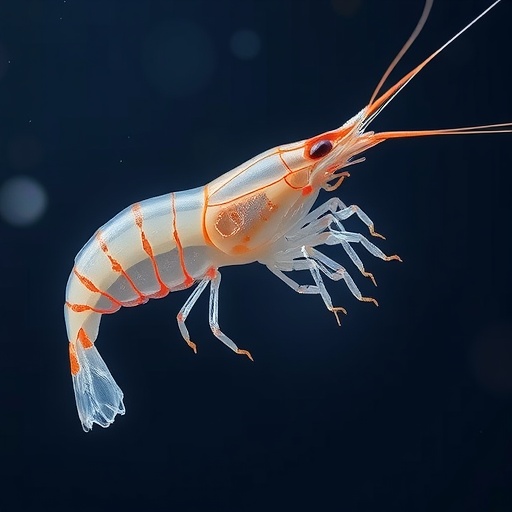In a groundbreaking study published in the journal Scientific Reports, researchers have uncovered a novel physiological condition affecting the midgut of translucent or glass post-larvae of whiteleg shrimp. This condition, termed midgut smooth muscle necrosis (MSMN), poses significant implications for aquaculture and the health of shrimp populations globally. The whiteleg shrimp, a crucial species in the seafood industry, has been widely farmed, and any factors threatening their health are of paramount concern.
The study, conducted by Srisala, Sanguanrut, and Powtongsook, examines the etiology and implications of MSMN in detail. The researchers highlight the increasing prevalence of this condition in shrimp farms, raising alarms among aquaculturists as it may impact growth rates and overall yield. The findings provide an in-depth analysis of the condition’s pathology, revealing that the necrosis primarily affects the smooth muscles of the midgut, impairing the shrimp’s ability to efficiently digest food.
As aquaculture continues to expand, the economic stakes rise. The whiteleg shrimp, known scientifically as Litopenaeus vannamei, represents a significant percentage of global shrimp production. Detecting novel disease mechanisms like MSMN is crucial for the development of effective management strategies. The researchers detail how the progression of MSMN can lead to stunted growth and increased mortality rates among affected post-larvae. This emphasizes the urgent need for more rigorous health monitoring protocols in shrimp farming practices.
The authors of the study utilized advanced histopathological techniques to assess the midgut tissues from affected shrimp. Through meticulous examinations, they identified necrotic lesions and a marked decline in muscle fiber integrity within the midgut. This degeneration compromises the shrimp’s digestive function, which is vital for their overall health and survival in a competitive aquaculture environment. As populations of healthy shrimp diminish, the potential for economic loss escalates for farmers relying on consistent and robust production rates.
Additionally, the study addressed potential environmental factors contributing to the emergence of MSMN. As shrimp farming often occurs in nutrient-rich estuarine environments, the authors speculate that shifts in water quality, combined with elevated nutrient loads, could be implicated in the onset of midgut smooth muscle degeneration. This linkage underscores the importance of maintaining optimal aquaculture environments to prevent adverse health outcomes in cultured species.
The researchers also highlight the role of disease management in combating MSMN. Early detection and intervention could be key to mitigating its impact. They propose a framework for regular health assessments, advocating for the integration of modern diagnostic technologies to identify symptomatic shrimp promptly. By monitoring health conditions in real time, aquaculturists could react swiftly to any indications of MSMN, thereby safeguarding their stock and preventing widespread outbreaks.
Moreover, the study opens avenues for future research focused on potential genetic predispositions to MSMN in whiteleg shrimp. Understanding the heritability of susceptibility to this condition may facilitate selective breeding programs aimed at cultivating more resilient shrimp strains. Such genetic advancements could bolster the industry’s capability to withstand emerging diseases without sacrificing production efficiency.
Nutrition plays an indispensable role in the overall health of shrimp, and MSMN may reveal insights into how dietary components can influence midgut well-being. The researchers suggest that nutritional interventions could be vital for ameliorating the risks associated with MSMN. By tailoring feed formulations to enhance midgut robustness or by incorporating protective additives, aquaculturists may mitigate the adverse effects of this disease.
As a result of these findings, calls have been made for collaborative efforts between researchers, industry stakeholders, and policymakers to forge a comprehensive strategy aimed at addressing the complexities surrounding MSMN. Creating awareness within the aquaculture community is paramount; sharing research outcomes such as these could empower prevention strategies on a broader scale.
Additionally, public health implications arise from these findings, as the consumption of compromised shrimp can have downstream effects on food safety. In regions where shrimp are a dietary staple, ensuring that only healthy specimens reach the consumer’s plate is non-negotiable. The study ultimately emphasizes a holistic approach to shrimp farming, where health, management practices, and consumer safety are seamlessly integrated.
It is clear that MSMN is not just a localized concern but a symptom of broader challenges facing aquaculture and sustainability. Sharing these discoveries with the global aquaculture community could aid in fostering proactive approaches to disease management. The realization that environmental changes, nutritional deficiencies, and genetic factors interplay in the health of aquaculture species underscores the urgent need for multidisciplinary research efforts to tackle these issues.
In conclusion, the research conducted by Srisala et al. provides vital insights into midgut smooth muscle necrosis in whiteleg shrimp, presenting a complex interplay between aquaculture practices and environmental factors that must be carefully navigated. The revelations surrounding MSMN not only suggest immediate actions for shrimp farmers but also pave the way for future investigations into nutrient management, disease resilience, and sustainability frameworks within the aquaculture industry.
This research highlights an essential chapter in the ongoing story of aquaculture and its adaptability in the face of emerging challenges. By prioritizing health, nutrition, and environmental stewardship, stakeholders can work together to ensure the longevity and sustainability of shrimp farming, safeguarding food sources for future generations.
Subject of Research: Midgut smooth muscle necrosis in whiteleg shrimp
Article Title: Novel midgut smooth muscle necrosis (MSMN) in translucent or glass post-larvae of whiteleg shrimp
Article References: Srisala, J., Sanguanrut, P., Powtongsook, S. et al. Novel midgut smooth muscle necrosis (MSMN) in translucent or glass post-larvae of whiteleg shrimp. Sci Rep 15, 35544 (2025). https://doi.org/10.1038/s41598-025-19591-6
Image Credits: AI Generated
DOI: 10.1038/s41598-025-19591-6
Keywords: midgut smooth muscle necrosis, whiteleg shrimp, aquaculture, disease management, nutrition, environmental factors, health assessments, sustainability




